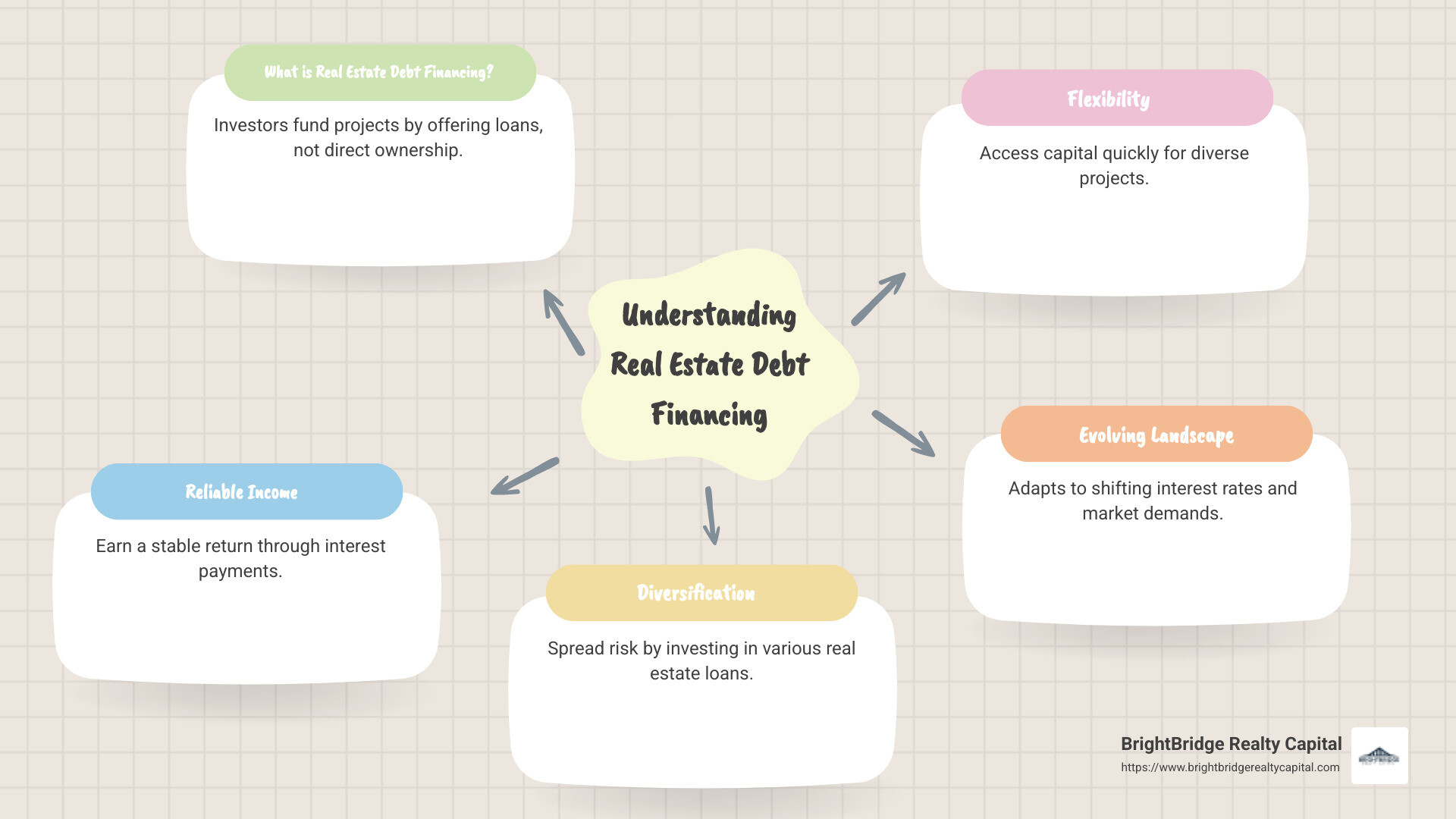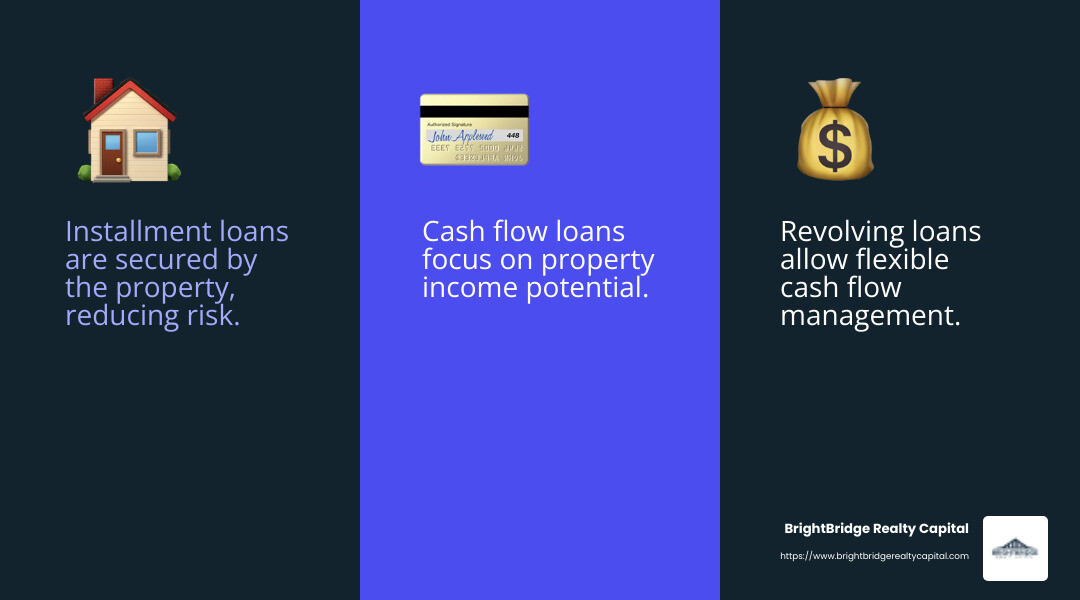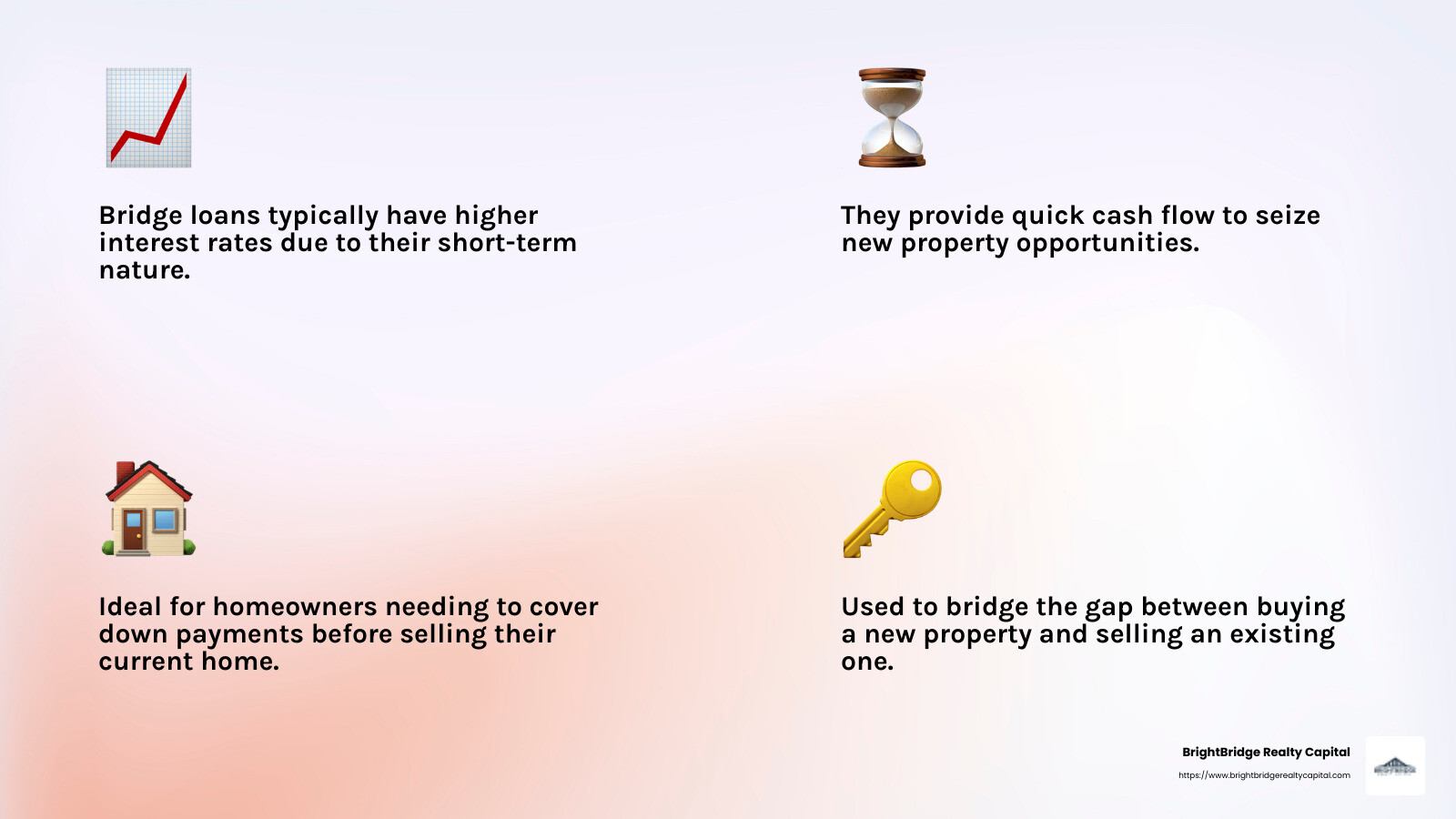Financing Your Future: A Guide to Real Estate Debt

Real estate debt financing is a crucial concept for investors who seek steady income and flexibility without owning property directly. In today's dynamic economic landscape, real estate debt funds have emerged as essential tools for financing projects ranging from fix-and-flip ventures to large-scale developments.
What is real estate debt financing? It's a way for investors to fund real estate projects by offering loans, instead of owning the real estate outright. Here's a quick breakdown:
- Reliable Income: Earn a stable return through interest payments.
- Diversification: Spread risk by investing in various real estate loans.
- Flexibility: Access capital quickly for diverse projects.
Real estate debt funds allow investors to participate in real estate markets while mitigating some risks associated with direct ownership. They are increasingly important as the financing landscape evolves, with interest rates and market demands shifting continually.

Real estate debt financing word roundup:
Understanding Real Estate Debt Financing
Real estate debt financing is a way for investors to lend money for real estate projects instead of purchasing properties themselves. This method offers several tools to tailor financial solutions to different needs. Let's explore the key types of debt financing:
Installment Loans
Installment loans are straightforward. The borrower receives a lump sum and repays it in fixed amounts over time. This type of loan is predictable, with set repayment schedules that make it easy for investors to plan their cash flow.
These loans can be secured or unsecured, but in real estate, they are typically secured by the property itself. This security reduces risk, as lenders can reclaim the property if the borrower defaults.
Revolving Loans
Revolving loans offer more flexibility. Instead of a one-time loan, they provide ongoing access to funds, similar to a credit card. Borrowers can draw, repay, and redraw funds as needed, up to a set limit.
This type of financing is great for projects with uncertain costs or timelines. It allows borrowers to manage cash flow efficiently, accessing funds when needed without the pressure of a fixed repayment schedule.
Cash Flow Loans
Cash flow loans are based on the cash-generating ability of the property rather than the borrower's creditworthiness. The loan amount and terms depend on the property's income potential, making it ideal for properties with strong rental income.
This type of financing is particularly useful for investors who may not have a traditional income or strong credit score. It focuses on the property's ability to generate revenue, providing a practical solution for many real estate transactions.

By understanding these types of real estate debt financing, investors can choose the right option to match their goals and risk tolerance. Whether it's the predictability of installment loans, the flexibility of revolving loans, or the income focus of cash flow loans, each type offers unique benefits for financing real estate projects.
The Role of Real Estate Debt Funds
Real estate debt funds have emerged as a crucial player in real estate financing. These funds are primarily private equity-backed, meaning they pool capital from investors to provide loans to real estate projects. The aim? To offer flexible and quick financing solutions where traditional lenders might hesitate.
Private Equity-Backed
These funds are supported by private equity, which means they have a substantial pool of capital at their disposal. This backing allows them to offer more customized loan solutions compared to traditional banks, which often have stricter lending criteria.
Collateralized Loans
The loans provided by real estate debt funds are typically collateralized. This means they are secured by real estate assets. If a borrower defaults, the fund can claim the property, reducing the risk involved. This security is a significant reason why investors are attracted to these funds. They offer a safety net, ensuring that even in challenging economic times, the investment is protected by tangible assets.
Interest Payments
Investors in these funds earn returns through interest payments on the loans. These payments are often higher than those from traditional fixed income investments, like government bonds. Why? Because they reflect the higher risk and the specialized nature of the loans.
Moreover, real estate debt funds might also receive additional income through loan origination and exit fees. This makes them an attractive option for investors seeking reliable income streams.
In today's market, where interest rate volatility is common, these funds provide a stable income source. They fill a vital gap by offering loans that might be too risky or complex for conventional lenders, especially in the commercial real estate sector.
By understanding the role of real estate debt funds, investors can appreciate how these funds contribute to the financing landscape. They provide not just capital, but also the flexibility and security that are often needed in real estate projects.
Types of Real Estate Debt Financing
When it comes to real estate debt financing, there are several types of loans that cater to different needs and situations. Let's explore the main types: bridge loans, construction loans, and property rehab loans.
Bridge Loans
Bridge loans are short-term loans designed to "bridge" the gap between buying a new property and selling an existing one. They're often used in situations where a quick purchase is necessary, and the seller hasn't yet sold their current property.
These loans typically come with higher interest rates because of their short-term nature and the urgency they address. Despite the cost, they offer the flexibility and quick cash flow needed to seize new opportunities. For instance, if you're a homeowner looking to buy a new house but haven't sold your current one, a bridge loan can help you cover the down payment on the new home.

Construction Loans
Construction loans are specifically for financing the construction or renovation of buildings. These loans are crucial for developers and individual homeowners looking to build or significantly renovate a property.
They are flexible, often with variable interest rates, and can convert into permanent financing once the project is completed. However, due to the risks associated with construction—like delays or cost overruns—these loans usually have higher interest rates.
For example, if you're planning to build a new home from scratch, a construction loan will cover the costs until the home is built, after which you might transition to a regular mortgage.
Property Rehab Loans
For those looking to invest in "fixer-uppers" or undertake significant renovations, property rehab loans are the go-to option. These loans allow investors, house flippers, and homeowners to finance both the purchase and renovation of a property with a single loan.
The most popular type of rehab loan is the FHA 203(k) loan, which is backed by the government. This type of loan is attractive because it simplifies the financing process by combining costs into one mortgage, making it easier to manage and budget.
Each of these loans serves a unique purpose and caters to specific real estate financing needs. Understanding these options can help investors and homeowners make informed decisions about which type of financing best suits their situation.
Benefits of Real Estate Debt Financing
When considering real estate debt financing, there are several key benefits that make it an attractive option for investors. Let's explore the details of stable income, risk-adjusted returns, and diversification.
Stable Income
One of the most compelling benefits of real estate debt financing is the potential for stable income. By investing in real estate debt, you can receive regular interest payments, which provide a predictable and reliable cash flow. This is especially important for institutional investors like pension schemes and insurance companies that need to meet obligations to policyholders or ensure they can cover pension payments. For example, interest from real estate loans can serve as a steady income stream that helps these entities meet their financial commitments.
Risk-Adjusted Returns
Real estate debt investments often offer attractive risk-adjusted returns. Compared to equity investments, investing in senior debt comes with relatively lower risk while still providing competitive yields. This is a crucial consideration for investors who prioritize capital preservation. Historically, real estate debt has shown to deliver solid returns with less volatility, making it a smart choice for those looking to balance risk and reward. For instance, pension schemes that focus on stable returns can benefit from the lower risk profile of real estate debt.
Diversification
Another significant advantage of real estate debt financing is diversification. By adding real estate debt to a portfolio, investors can spread their risk across different asset classes, such as stocks and bonds. This diversification helps reduce overall portfolio volatility. Real estate debt investments are typically secured by tangible assets, which provides an additional layer of security. For example, if a borrower defaults, the lender can take possession of the collateralized property, minimizing the risk of principal loss.
Incorporating real estate debt financing into an investment strategy can provide stable income, attractive risk-adjusted returns, and diversification. These benefits make it a valuable asset class for investors seeking to improve their portfolios and achieve long-term financial goals.
Frequently Asked Questions about Real Estate Debt Financing
What is a real estate debt fund?
A real estate debt fund is a pool of capital raised from private equity investors. These funds are used to provide loans to real estate developers and property owners. Unlike traditional banks, real estate debt funds offer more flexible terms and quicker access to capital. They play a crucial role in the commercial real estate market by providing financing solutions when conventional lenders might hesitate.
How do real estate debt funds generate income?
Real estate debt funds primarily generate income through interest payments from the loans they issue. These interest rates can start at 9% or higher, depending on the economic environment. The income generated is usually distributed to investors on a monthly basis. Additionally, these funds earn revenue from various borrower fees, such as origination, servicing, and exit fees.
In cases where a borrower defaults, the debt fund may take possession of the collateralized property. This can be an opportunity to acquire assets at below-market prices, stabilize them, and sell them for a profit when the market recovers.
Why choose real estate debt over traditional fixed income?
Real estate debt offers several advantages over traditional fixed income investments, like bonds. One key benefit is collateralization. Loans are secured by tangible assets, such as properties, providing a safety net in case of borrower default. This makes real estate debt a relatively safer investment compared to unsecured fixed income options.
Moreover, real estate debt can be part of securitization processes, where loans are pooled together and sold as securities. This can offer additional liquidity and diversification for investors. These features make real estate debt an attractive option for those looking to diversify their portfolios and achieve stable returns.
Incorporating real estate debt into an investment strategy can offer unique advantages, making it a compelling choice for investors seeking stability and security in uncertain times.
Conclusion
In the ever-changing world of real estate, having quick access to capital and flexible financing solutions is vital. BrightBridge Realty Capital stands out by offering just that. We specialize in providing real estate debt financing that caters to the unique needs of every investor, ensuring a seamless and efficient process.
Our direct lending approach eliminates the middleman, allowing for competitive rates and fast closings, often within a week. This speed and efficiency mean you can seize opportunities as they arise, without unnecessary delays. Whether you're flipping properties, constructing new developments, or expanding a rental portfolio, our custom solutions are designed to keep your projects moving forward.
By choosing BrightBridge Realty Capital, you're not just getting a lender; you're gaining a partner committed to supporting your investment journey. Our nationwide reach ensures you're covered no matter where your real estate ventures take you.
Ready to take the next step in your real estate investment journey? Explore our loan options and see how we can help you achieve your goals.
With BrightBridge Realty Capital, you have the tools to finance your future with confidence and success.


